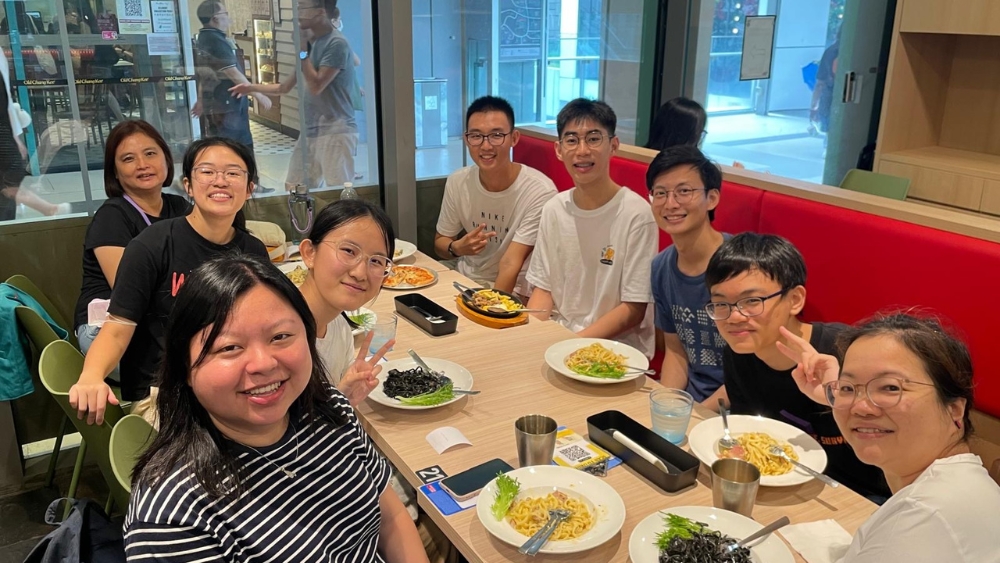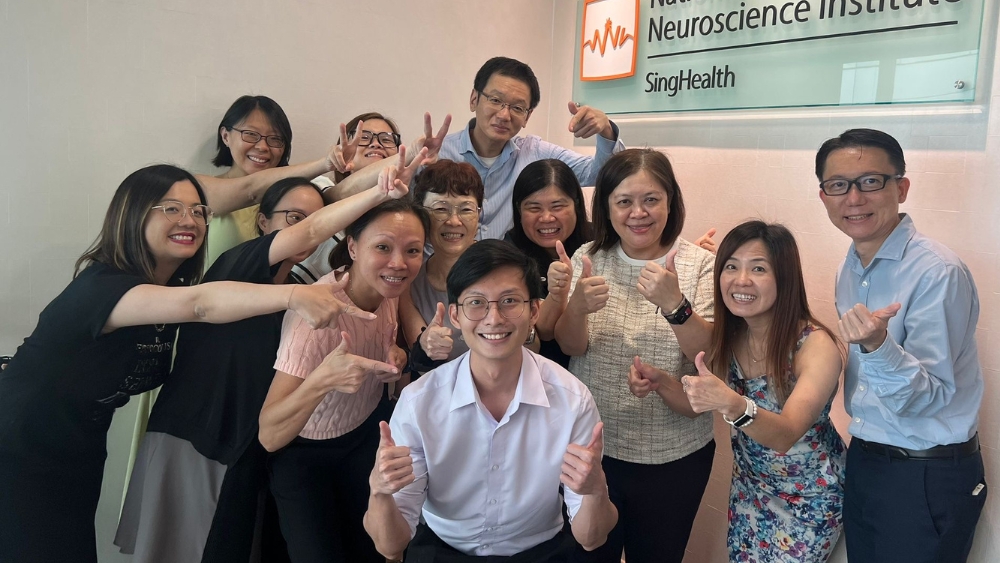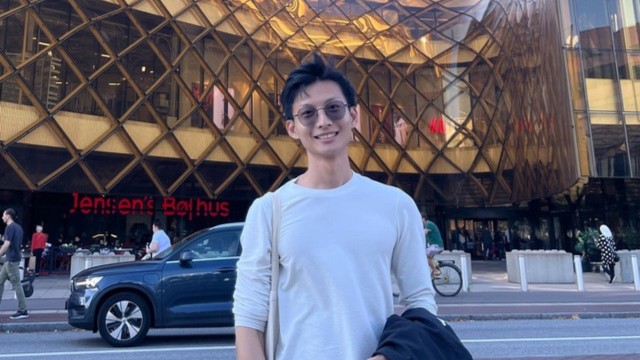Bridging Accountancy and Health Economics to Build Better Healthcare
Bryan Lee, an SMU Accountancy student with a second major in Health Economics and Management, is using his interdisciplinary education to improve healthcare delivery. Combining financial acumen with a passion for community care, he hopes to pursue a medical degree and contribute to building a more sustainable and equitable healthcare system.
What if finance and medicine weren’t so different after all?
To SMU Accountancy student Bryan Lee, they’re deeply connected. A firm believer that quality healthcare relies on both clinical excellence and sustainable management, Bryan is charting a unique path that brings together his head for numbers and heart for people.
Pursuing a Bachelor of Accountancy with a second major in Health Economics and Management, and volunteering regularly at community hospitals, Bryan hopes to play a part in shaping a healthcare system that’s not only effective—but also accessible, efficient and compassionate.
Volunteering with Purpose: A Path to Empathy
You’ve volunteered in various community initiatives. What motivates you to give back, and how has it shaped you?
I enjoy volunteering because it’s extremely fulfilling to see the tangible impact it can create for others. Knowing that my time and effort can make a difference motivates me to give back to the community. During National Service (NS), when I had fewer personal commitments on weekends, I actively searched for volunteering opportunities.
Although many health-related activities were suspended due to the Covid-19 pandemic, I was fortunate to find an opportunity with Ulu Pandan STARS, mentoring and teaching children from underserved backgrounds. I’ve continued volunteering with them since.
This experience has opened my eyes to various societal challenges, and nurtured me to be more empathetic and understanding. It also helped honed my communication skills, especially in engaging with people from all walks of life—from beneficiaries to fellow volunteers and coordinators.
A Passion for Healthcare Begins with Connection
What sparked your growing interest in improving healthcare access?
I’ve always been very interested in healthcare because I believe it’s the foundation of a person’s ability to live a full and meaningful life. The saying “health is wealth” deeply resonates with me.
Without good health, it’s difficult for someone to pursue their aspirations or manage daily life. Health isn’t just physical—it includes mental and social well-being too.
That’s why I started volunteering at Ang Mo Kio Thye Hua Kwan (AMK-THK) Community Hospital, going for in-patient befriending sessions every Saturday. Some of the patients were long-term residents without regular visitors. Over time, I started recognising familiar faces, and it warmed my heart when they remembered me or smiled as I entered. Those moments reminded me how important human connection is in the healing process.
Although the pandemic restricted my volunteering at AMK-THK, my commitment to healthcare volunteering never faded. As soon as I could, I resumed volunteering—this time at Jurong Community Hospital in early 2024.

Why This Uncommon Pairing: Accountancy and Health Economics?
You’re taking a rather unique academic path. What prompted this interdisciplinary choice?
My interest in Health Economics and Management stems from a desire to understand the healthcare sector from various perspectives, from patient care, structure, financing, to management.
Through this second major, I’ve been able to explore how market forces affect healthcare services and products, and how policies, resource allocation, and decisions at the system level influence patient and provider outcomes.
Although Accountancy and Health Economics may not appear directly related, I have come to appreciate the value of accounting knowledge in healthcare. Accountancy has equipped me with a strong analytical mindset, an eye for business processes, and the ability to interpret financial information critically. These skills are essential for identifying inefficiencies, improving budgeting decisions, and ensuring the sustainability of healthcare services.
Financial constraint is one of the biggest obstacles in healthcare—affecting patients, providers, and even research. By understanding both the financial backbone and the economic dynamics of healthcare, I hope to help build systems that are efficient, equitable, and responsive to real-world needs.
A Front-Row Seat to Healthcare Innovation
Tell us more about your internship with Duke-NUS Medical School. How are you managing your time across school and work?
I was fortunate to connect with a current PhD student from the Health Services & Systems Research department at Duke-NUS Medical School, which led to my internship.
I was drawn to the meaningful nature of their projects, which directly contribute to improving Singapore’s healthcare system. I was eager to contribute in any way I could.
As a research intern, I assist with literature reviews, transcribe interviews for a qualitative study, and help compile online educational resources for a digital health initiative. Each task has deepened my understanding of how healthcare research can be applied in the real world.
Since this internship runs concurrently with my academic semesters, effective time management has been crucial. I am grateful to be able to work with a supportive research team that checks in regularly to align my workload and progress.
I plan my deadlines ahead of time and try to prioritise tasks early. Being prepared and communicating openly has helped me manage both my academic responsibilities and internship commitments.
Preparing for a Future in Medicine—and Beyond
How has your time at SMU shaped your aspirations?
I hope to pursue a postgraduate medical programme to gain clinical skills and essential knowledge to provide high-quality patient care. With a medical degree, I hope to combine my passion for healthcare with my desire to serve the community.
My time at SMU has played a big role in shaping this path. Through my Accountancy degree and second major, I’ve developed strong analytical skills and gained important insights into the economic and management aspects of healthcare. These are critical for understanding the bigger picture and the complexities of delivering sustainable healthcare.

My internships have also given me exposure to different parts of the healthcare ecosystem—from auditing in the private sector, to working in the finance department at the National Neuroscience Institute, and later with the International Cooperation Division at the Ministry of Health. These experiences helped me understand healthcare at both the operational and policy levels.
They’ve strengthened my belief that we must look at healthcare holistically—from the patient experience at the frontlines to strategic system-wide planning. My next step is to gain the clinical expertise needed to complement this foundation, and I hope to continue learning throughout my career. I believe SMU has equipped me not just with academic knowledge, but also the perspective and versatility to make a meaningful difference.
Bryan’s journey is a powerful reminder that interdisciplinary knowledge can spark real impact.
Inspired by his passion to transform healthcare for the community?
Discover how SMU’s Bachelor of Accountancy and second major options can empower you to make a difference—wherever your passion leads.




